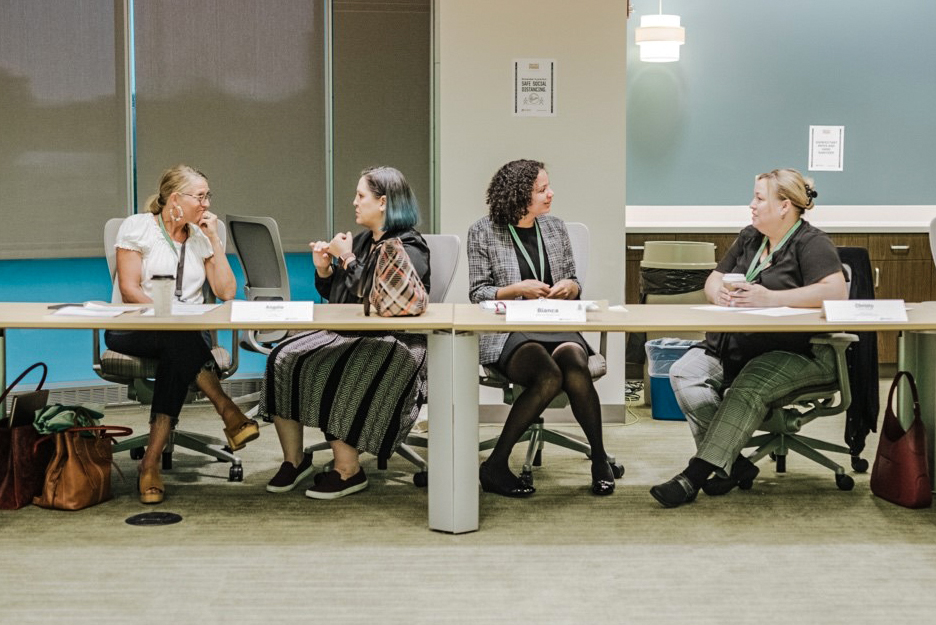Purdue Focus Forward Fellowship helps women veterans take giant leaps in higher education
Written By: Rebecca Hoffa, rhoffa@purdue.edu

The 2022 Focus Forward Fellows engage in an activity as part of the five-day residency program. (Photo provided)
As the first nationwide program designed specifically for women student veterans, the Focus Forward Fellowship, established in 2016, has helped 130 women veterans who are working toward a college degree find connection, build career skills and set their sights on success. The nationally competitive program, which is housed in the Purdue University College of Health and Human Sciences’ Military Family Research Institute (MFRI), is welcoming its largest-ever cohort this summer, bringing 24 women to campus from July 18-22.

Maya Nix(Photo provided)
For Navy veteran and former fellow Maya Nix, the fellowship was pivotal in helping bridge the gap between military service and higher education.
“Being in the niche that I am as a female veteran and coming back to higher education, there is definitely a barrier compared to those civilian individuals who are just going into their studies — they’re young; they don’t have a lot of world experience — so there’s definitely a difference of engagement level,” Nix said. “As veterans, we’re really used to having that community, being a part of something a little bigger than ourselves. The fellowship was able to not only fill those bigger needs but also provide that support and encouragement to go further.”
The fellowship is organized in two parts. The first is an intensive five-day residency program on Purdue’s West Lafayette campus, where the women explore sessions and activities in personal strengths, identity, emotional intelligence, career skills and more. After the women leave campus, they begin the second part of the fellowship, which is an online community that allows them to dive deeper into what they learned. The Focus Forward Fellowship also pairs women with a coaching mentor, who is a woman student veteran who has gone through the program previously, as well as a career mentor, who has a career in the fellow’s chosen field.
“We purposely have small cohorts so they can have the intimate connection between their cohort and within their small groups — they’re not just one of thousands that are lost in a crowd,” said Stacy Parnell, MFRI senior education and employment specialist. “We also find that so many of our women don’t have any sort of formal mentor, so we make sure they leave with two to help plant that seed for the value of mentoring.”
Nix said she still has a great connection with her career mentor, even two years after completing her fellowship. The two recently connected after her graduation from Western Michigan University, where she earned her master’s degree in social work. Coming back as a coaching mentor for the 2022 cohort, Nix has been able to make those types of connections with her own mentees.
“Being in the fellowship gave me the experience of what I would like from a mentor,” Nix said. “So, I think I’ve been able to provide that this past year for my mentees.”

Mentorship and networking is an important component of the Focus Forward Fellowship, with fellows being paired with both a coaching mentor and a career mentor. (Photo provided)
The program was initially developed under the leadership of Shelley MacDermid Wadsworth, MFRI director and distinguished professor in the Department of Human Development and Family Science, after listening to data presented at the Student Veterans of America national conference.
“I was powerfully struck by some of the findings that were shown,” MacDermid Wadsworth said. “The data suggested that women veterans were not doing as well on a variety of indicators as women non-veterans or as men, whether veteran or non-veteran. If they were in the workforce, they were feeling more disengaged from their work than the other groups. If they were in college, they felt less connected to faculty, less belonging on their campuses and more isolated. I watched that presentation, and I thought, ‘We could do something about that. These are solvable problems.’”
The program is funded entirely by MFRI donors, from monetary support to in-kind donations from businesses.
“We have some amazing grantors who see the high value of the program,” Parnell said. “It’s all grant-funded, and the women pay nothing. If they drive, we’ll reimburse mileage; if they fly, we book the flights — we pay for everything from when they get here to when they get home.”
The Focus Forward Fellowship is just one of the many programs offered by MFRI to support veterans and their families, with the institute making strides in areas from education to food security to mental health and beyond.
“So much of the problem when we’re trying to support families is getting the right thing to the right person at the right time, and it’s very difficult to do,” MacDermid Wadsworth said. “If you look across all of MFRI’s initiatives, the common thread is that we are trying to help existing systems work better around the families they encounter.”
After seeing six cohorts of women come and go through the program, MacDermid Wadsworth noted the difference she has seen the fellowship make in the lives of these women veterans and their families.
“As a faculty member, it’s always so rewarding when you’re working with people who have enormous potential but are a little hesitant about it to just help them celebrate it, savor it and go for it,” MacDermid Wadsworth said. “These women are just ready to soar in their lives. Helping them to feel really ready, excited and well-equipped for that is a great joy.”
For more information about the fellowship and how to get involved, visit the Focus Forward Fellowship website or join the mailing list.